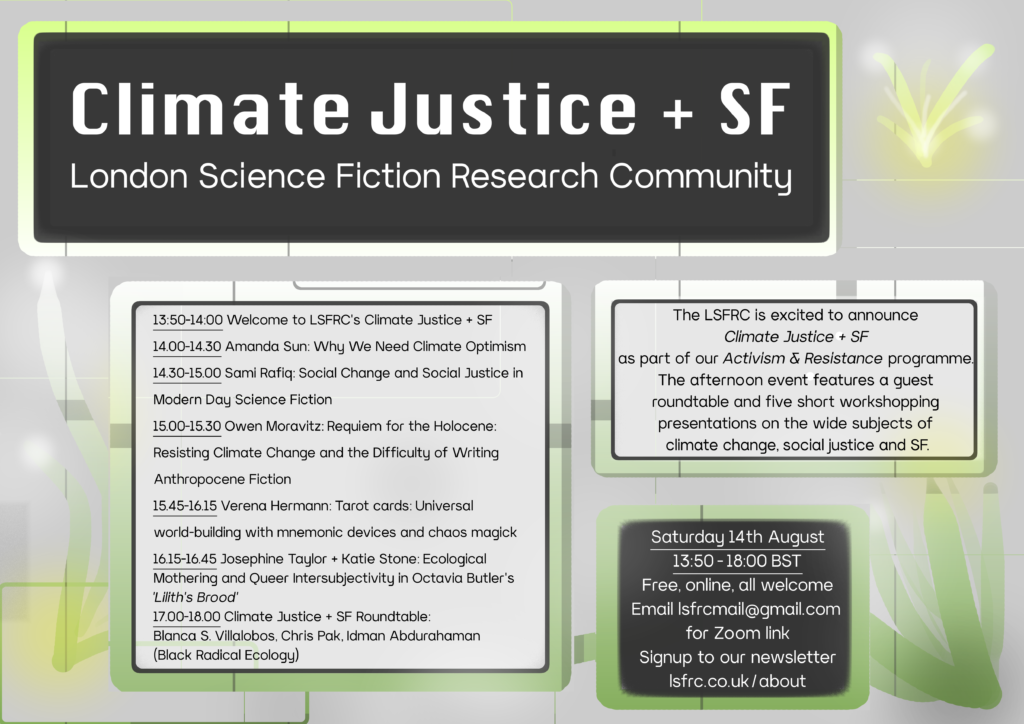
The LSFRC’s Climate Justice + SF day event schedule is now announced!
Climate and environmental changes have long been an integral part of science and speculative fiction. As part of our Activism & Resistance programme, we’re looking at how the increased engagement recently reflects the growing global climate movement towards action.
For Climate Justice + SF, the afternoon event features artists, organisers and scholars working in climate justice and its themes around the world. We have a selection of workshop-style presentations and discussions, and the day concludes with a guest roundtable featuring Blanca S. Villalobos, Idman Abdurahaman and Chris Pak.
With this event, we ask:
- What kinds of cultural narratives and activistic strategies does SF shape in relation to climate change globally?
- How do these work to confront the colonial history of climate change and challenge the systemic powers that caused and sustain the climate crisis?
- What are the critical approaches in SF that ensure intersectional approaches are integral to the work, which joins the global struggle for climate justice in sincere solidarity?
We’re encouraging an expansive and inclusive view of what climate justice looks like in relation to SF across activism, the arts, academia and beyond. We recognise that climate change is a problem of power, one that originates from colonial extractions and continued petrocapitalist imperialism. Therefore, only intersectional approaches towards climate issues will do – such that climate justice exists together with anti-colonial social justice activism that fights for racial, disability, LGBTQIA+ and class justices.
Schedule for Saturday 14th August, 13:50-18:00
To attend, please open our newsletter for the Zoom link and you can sign-up to the LSFRC newsletter here. Free and open to all.
13:50-14:00 Welcome to LSFRC’s Climate + SF event
14.00-14.30 Amanda Sun: Why We Need Climate Optimism
14.30-15.00 Sami Rafiq: Social Change and Social Justice in Modern Day Science Fiction
15.00-15.30 Owen Moravitz: Requiem for the Holocene: Resisting Climate Change and the Difficulty of Writing Anthropocene Fiction
15.30-15.45 Break (15 mins)
15.45-16.15 Verena Hermann: Tarot cards: Universal world-building with mnemonic devices and chaos magick
16.15-16.45 Josephine Taylor + Katie Stone: Ecological Mothering and Queer Intersubjectivity in Octavia Butler’s Lilith’s Brood
16.45-17.00 Break (15 mins)
17.00-18.00 Climate Justice + SF: Roundtable: Blanca S. Villalobos, Chris Pak, Idman Abdurahaman
Roundtable Guests

Idman Abdurahaman is a black feminist and a climate justice researcher. As an environmentalist, she is dedicated to exploring the climate crisis and environmental injustices from radical and alternative lenses, always moving towards full decolonisation and liberation for all. Currently Idman leads community food growing and nature connection projects in East London.
@_radicalecology Black Radical Ecology
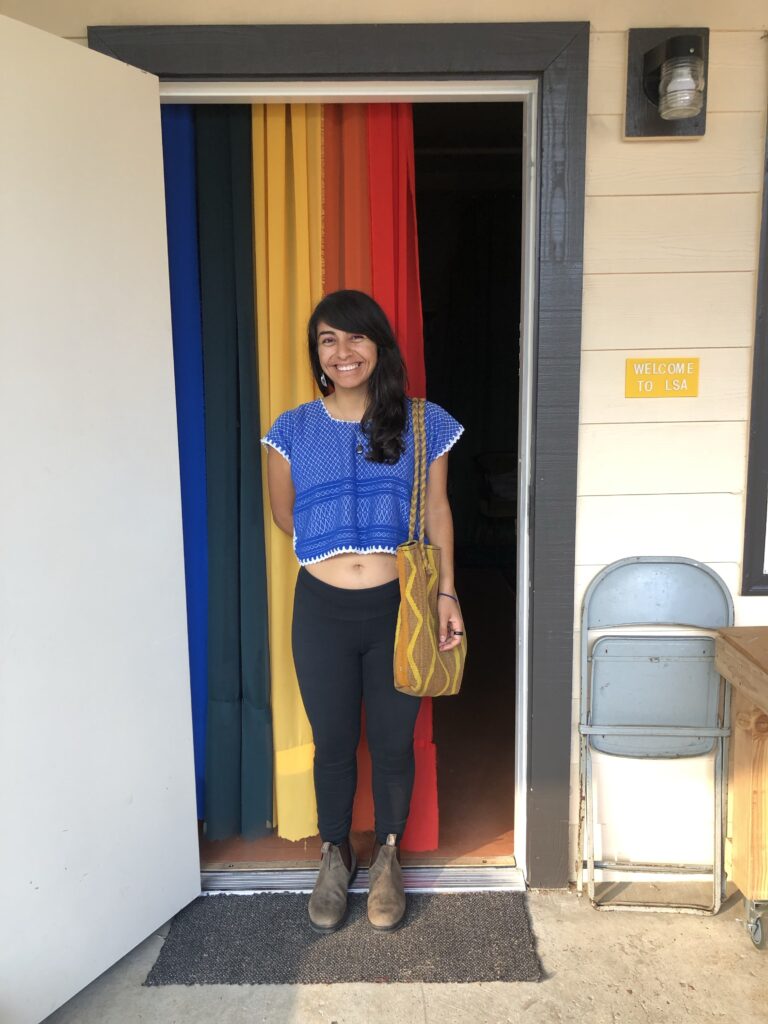
Blanca S. Villalobos (they/she) is a freelance cultural worker & interdisciplinary artist from the San Gorgonio Pass of Southern California with ancestral roots in Jalisco. They are a proud, queer daughter of Mexican immigrants and comes from a lineage of educators, artists and dream practicioners. Over the past 10 years they have had the honor of working with youth & families of color as a community educator and is currently co-facilitating a racial justice program for California desert conservation advocates.
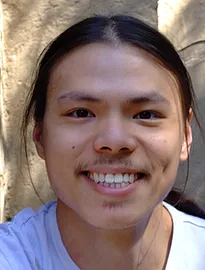
Chris Pak specialises in the study of Science Fiction and was an Arthur C. Clarke award judge from 2018-2020. His first postdoctoral appointment was as a researcher on the Corpus Linguistics project, “‘People’, ‘Products’, ‘Pests’ and ‘Pets: The Discursive Representation of Animals’” (Lancaster University), his second on the Digital Humanities project, “Modelling Between Digital and Humanities: Thinking in Practice” (King’s Digital Lab). He is the author of Terraforming: Ecopolitical Transformations and Environmentalism in Science Fiction (Liverpool University Press, 2016), a contribution to the Environmental Humanities, Utopian Studies and Postcolonialism that analyses how transformations to environments in science fiction interrogate the global politics of climate change and the Anthropocene.
Presentation Speakers
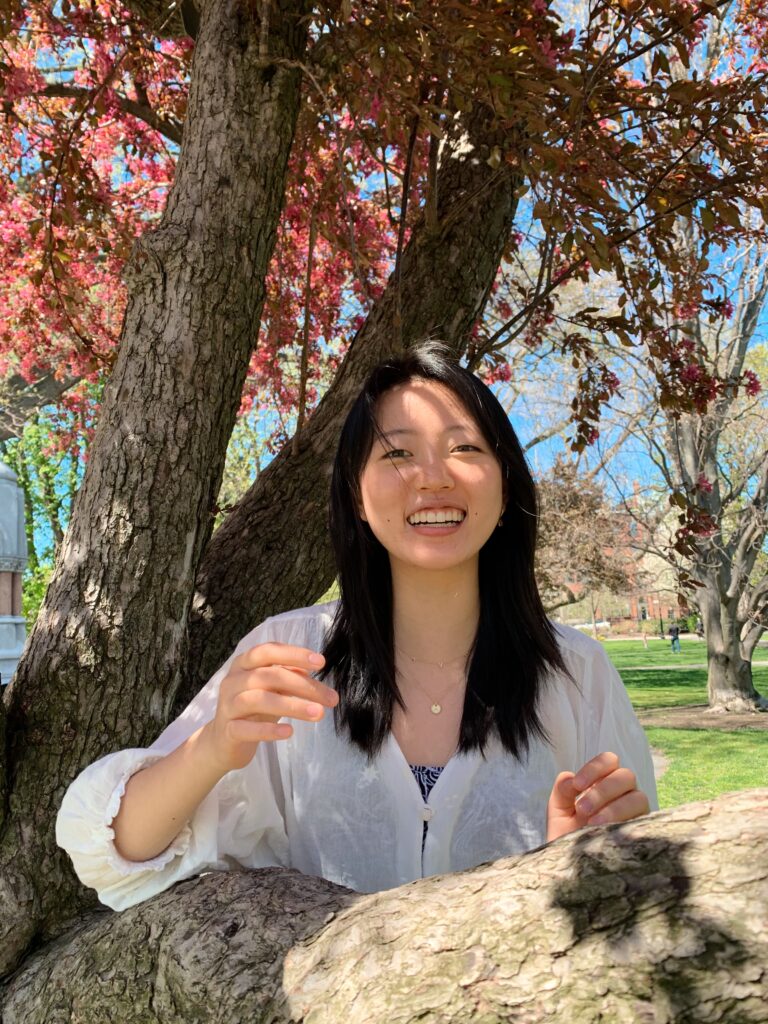
14.00-14.30
Amanda Sun: Why We Need Climate Optimism
Amanda Sun seeks to help people adapt to and slow climate change, goals that led her to study Engineering and Creative Writing at Dartmouth College. There, she chairs the Environmental Stewardship Division and is looking to start an effective altruism group as well. Outside of Dartmouth, she is involved with nonprofit EarthEcho International as a Youth Leadership Council member, and Cross-Campus Sustainability, a social justice and sustainability community she co-created that represents students from 40+ universities.
14.30-15.00
Sami Rafiq: Social Ferment and a Call for Justice in Modern Science Fiction Stories
Professor Sami Rafiq is Professor of English at Aligarh Muslim University, Aligarh, India.
Her published writings are related to Climate Change, Spirituality, Womens’ Studies and Translation. She has published more than 150 translations, features, short stories and poetry in Indian and international journals. She has also translated collections of poetry by noted Urdu writers like Asrarul Haq Majaz and Kaifi Azmi. She is the Founding and Chief Editor of Cloverleaf an online journal of Spiritual Heritage Education Network, Ontario, Canada.

15.00-15.30
Owen Moravitz: Requiem for the Holocene: Resisting Climate Change and the Difficulty of Writing Anthropocene Fiction
Owen Morawitz is an Honours graduate of the University of Queensland. He completed a BA (Hons Class I) with majors in English Literature and Philosophy and his work has been featured in Jacaranda and Exordium. His research focuses on violence in narrative fiction and media, alongside issues in continental philosophy, ontology, representation, aesthetics, anthropocentrism, and posthumanism. His Honours thesis deploys speculative realism and object-oriented ontology as a critical framework to analyse acts of violent transgression and the representation of things in author Cormac McCarthy’s novel, Blood Meridian (1985). Additionally, his writing on film, music, media and alternative culture has been featured in several publications for both print and online. Academic CV | Online Portfolio @PitchDiscontent
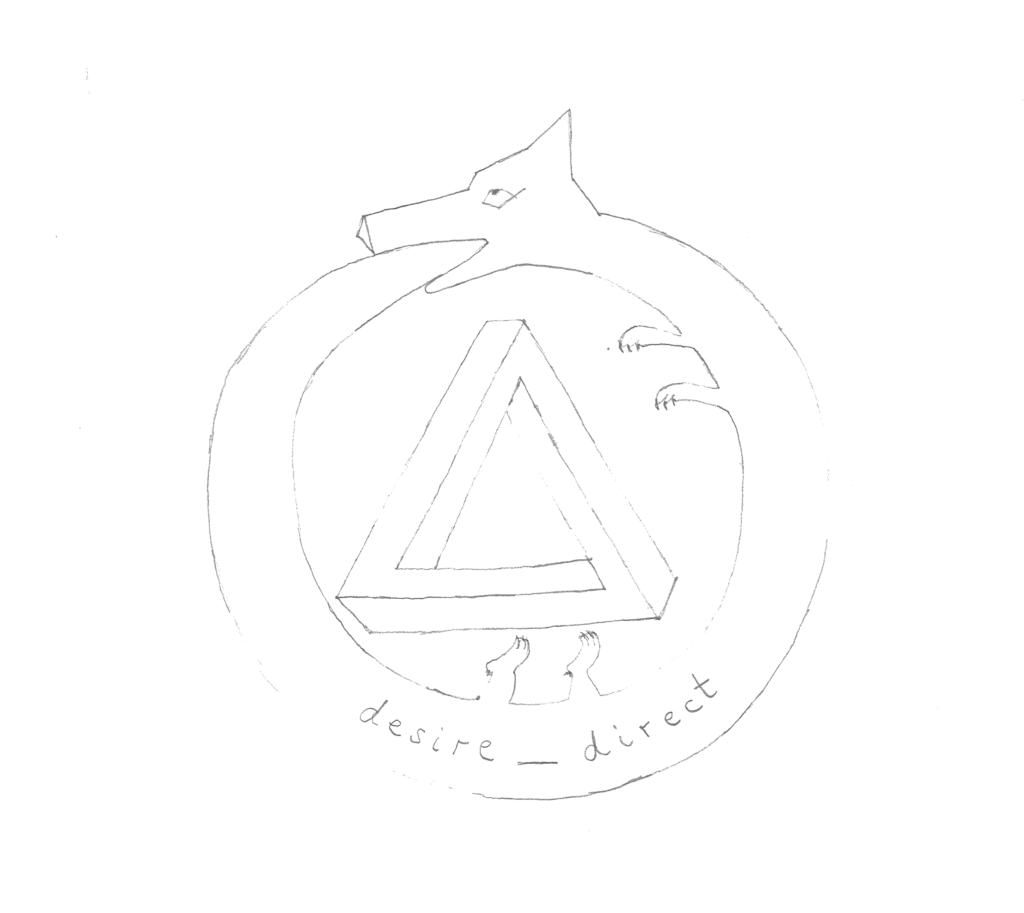
15.45-16.15
Verena Hermann: Tarot cards: Universal world-building with mnemonic devices and chaos magick
Verena is an independent researcher and author, who has attended the MA Interactive Media programme at the Centre for Cultural Studies, Goldsmiths. She creates speculative fiction, which deals with subjects like change, dynamics and time. Her experiments within a wide range of disciplines and media come together in the form of games, performance and poetry. In 2019 she published the RPG The VteX Files, which was performed at Noiselab, Berlin. In 2020, the ongoing project Sounds from the Stone Age (SftSA) was launched at STWST48x6, Linz, Austria.
16.15-16.45
Josephine Taylor + Katie Stone: Ecological Mothering and Queer Intersubjectivity in Octavia Butler’s Lilith’s Brood
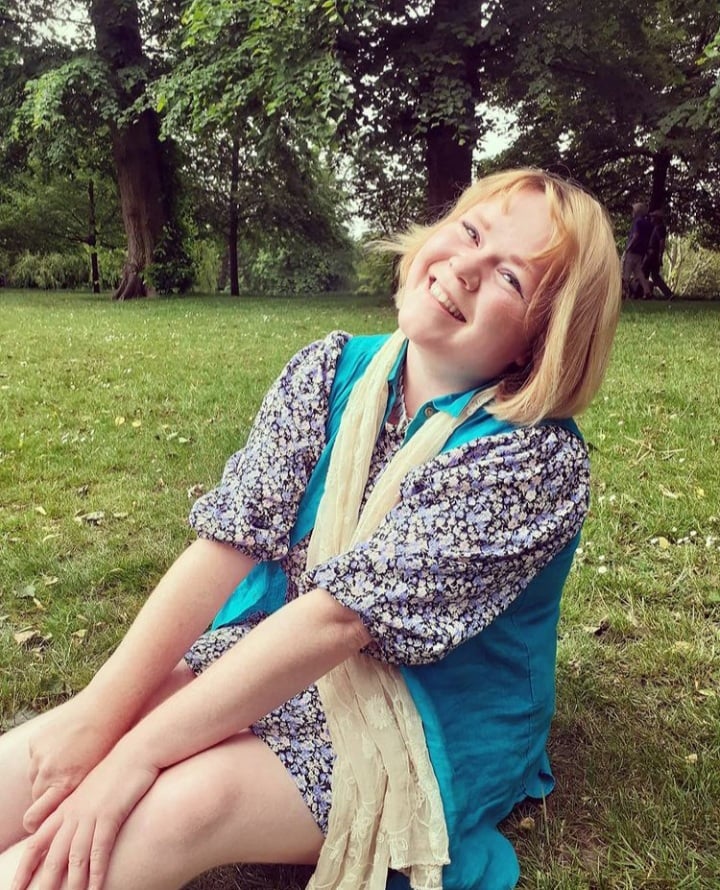
Josephine Taylor is a PhD student nearing completion at Royal Holloway, University of London in Comparative Literature and Culture. Her research explores petrocultures – cultures grounded in fossil fuels – and how regimes of extraction impact more than human life. She is one of the directors of LSFRC and member of the Beyond Gender collective. She has articles forthcoming on zombies, petrocultures, science fiction and energy. Her research interests include SF, Marxism, Queer Theory, and Philosophy. @JosieTaylor94

Katie Stone is an Associate Research Fellow based at Birkbeck, University of London where she recently completed her PhD. Her thesis explores the role played by childhood within utopian science fiction. Specifically, she suggests that the strange children of SF defy the conservative logic of capitalist, reproductive futurity that the Child is frequently enlisted to support. Katie is co-founder of the research network Utopian Acts and the research collective Beyond Gender. She has published work on H. G. Wells and imperialism, James Tiptree Jr. and transfeminism and has a forthcoming article in Utopian Studies on vampirism and utopian hunger. @cyborg_feminist
Leave a Reply